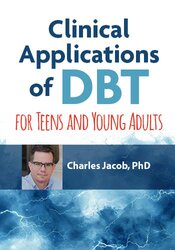
×

Feeling “stuck” in your clinical work with teens and young adults?
Are you, like so many of your colleagues, seeing more and more clients in the 12-25-year old age range who continue to struggle with sadness, anxiety, and anger in spite of your best efforts in therapy?
This is your chance to learn Dialectical Behavior Therapy (DBT) directly from expert Charles Jacob, PhD, and integrate it into your practice to effectively address the nuanced needs of this generation.
After just one day under Dr. Jacob’s renowned expertise, you will walk away with:
Purchase today to get the skills and confidence you need to successfully help your teen and young adult clients with the power of DBT!
All members of the PESI, Inc. planning committee have provided disclosures of financial relationships with ineligible organizations and any relevant non-financial relationships prior to planning content for this activity. None of the committee members had relevant financial relationships with ineligible companies or other potentially biasing relationships to disclose to learners. For speaker disclosures, please see the faculty biography.
Continuing education credit information is coming soon for this non-interactive self-study package.
CEs may be available for select professions, as listed in the target audience. Hours will be dependent on the actual recording time. Please check with your state licensing board or organization for specific requirements.
There may be an additional fee for CE certificates. Please contact our Customer Service at 1-800-844-8260 for more details.
**Materials that are included in this course may include interventions and modalities that are beyond the authorized practice of your profession. As a licensed professional, you are responsible for reviewing the scope of practice, including activities that are defined in law as beyond the boundaries of practice in accordance with and in compliance with your professions standards.

Charles Jacob, PhD, is a psychologist, research scientist, and author with over 20 years of clinical experience conducting and overseeing the delivery of mental health services to individuals with severe mood and personality disorders. He is a recognized expert in Dialectical Behavior Therapy (DBT), Cognitive Behavioral Therapy (CBT), and Motivational Interviewing (MI) and has delivered workshops, seminars, and courses on these topics at universities and institutions throughout the world. He has held numerous academic positions, and currently works as a research associate for a Washington DC-based consulting firm. He is a past president of the ACA’s Pennsylvania branch and has been a featured interviewee on several episodes of NPR’s The Pulse.
Dr. Jacob completed his PhD in the counseling ed program at the Pennsylvania State University followed by a year of postgraduate training at the Center for Cognitive Therapy at Penn. He was a Fulbright Specialist through the US Department of State, is certified in DBT and is an Evergreen Certifications approved CBT-C consultant.
Speaker Disclosures:
Financial: Charles Jacob maintains a private practice and has employment relationships with Calco Consulting Group and the University of New York in Prague. He receives royalties as a published author. Dr. Jacob receives a grant from the United States Bureau of Educational and Cultural Affairs. He receives a speaking honorarium and recording royalties from PESI, Inc. He has no relevant financial relationships with ineligible organizations.
Non-financial: Dr. Charles Jacob is a member of the American Counseling Association.
Visit our FAQ page at https://www.pesicanada.ca/faq or contact us at https://www.pesicanada.ca/contact-us.
Access never expires for this product.
Satisfaction Guarantee
Your satisfaction is our goal and our guarantee. Concerns should be addressed to info@pesicanada.com.
Please wait ...